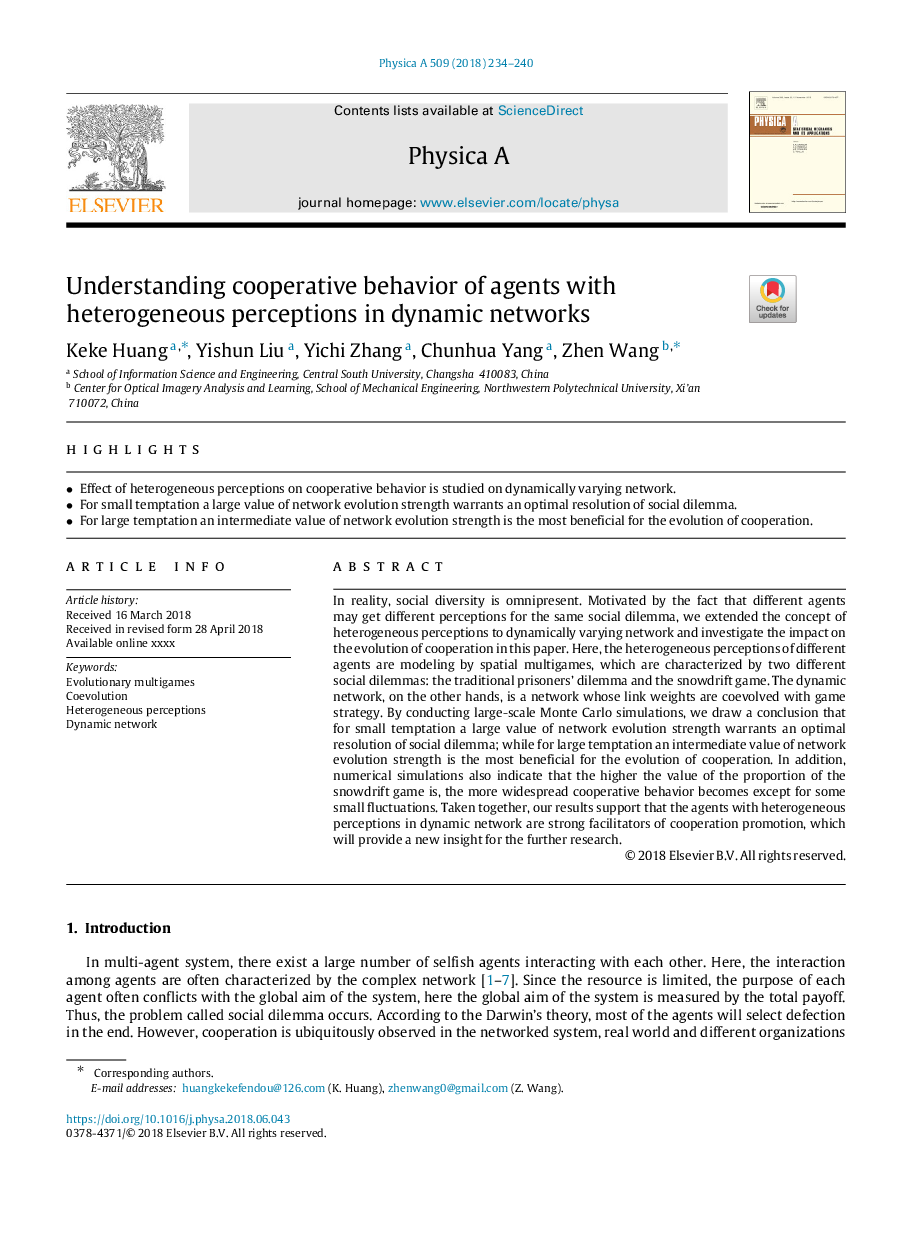| کد مقاله | کد نشریه | سال انتشار | مقاله انگلیسی | نسخه تمام متن |
|---|---|---|---|---|
| 7375019 | 1480064 | 2018 | 7 صفحه PDF | دانلود رایگان |
عنوان انگلیسی مقاله ISI
Understanding cooperative behavior of agents with heterogeneous perceptions in dynamic networks
ترجمه فارسی عنوان
درک رفتار همکاری عوامل با درک ناهمگونی در شبکه های پویا
دانلود مقاله + سفارش ترجمه
دانلود مقاله ISI انگلیسی
رایگان برای ایرانیان
کلمات کلیدی
ترجمه چکیده
در واقع، تنوع اجتماعی در همه جا وجود دارد. انگیزه این واقعیت که عوامل مختلف ممکن است درک متفاوتی برای یک معضل اجتماعی مشابه داشته باشند، ما مفهوم ادراکات ناهمگونی را به شبکه پویا تغییر دادیم و تاثیر آن بر تکامل همکاری در این مقاله بررسی کردیم. در اینجا، ادراکات ناهمگونی عوامل مختلف، توسط چندین بازی فضایی مدل سازی می شود که با دو معضل اجتماعی متفاوت مشخص می شود: معضلات زندانیان سنتی و بازی برفی. شبکه پویا، از سوی دیگر، یک شبکه است که وزن لینک آنها با استراتژی بازی هماهنگ است. با انجام شبیه سازی های مونت کارلو در مقیاس بزرگ، ما نتیجه گیری می کنیم که برای وسوسه های کوچکی، ارزش زیادی از قدرت تکامل شبکه، قطعنامه بهینه ای از معضل اجتماعی را تصویب می کند؛ در حالی که برای وسوسه بزرگ، مقدار متوسطی از قدرت تکامل شبکه، سودمندتر برای تکامل همکاری است. علاوه بر این، شبیه سازی های عددی نیز نشان می دهد که بالاتر از مقدار نسبت به بازی برف ریزه، رفتار تعاونی گسترده تر است به جز برخی از نوسانات کوچک. با هم نتیجه می گیریم، نتایج ما حاکی از آن است که عوامل با درک ناهمگونی در شبکه دینامیکی، تسهیل کننده های قوی ترویج همکاری هستند که بینش جدیدی را برای تحقیقات بیشتر فراهم می کند.
موضوعات مرتبط
مهندسی و علوم پایه
ریاضیات
فیزیک ریاضی
چکیده انگلیسی
In reality, social diversity is omnipresent. Motivated by the fact that different agents may get different perceptions for the same social dilemma, we extended the concept of heterogeneous perceptions to dynamically varying network and investigate the impact on the evolution of cooperation in this paper. Here, the heterogeneous perceptions of different agents are modeling by spatial multigames, which are characterized by two different social dilemmas: the traditional prisoners' dilemma and the snowdrift game. The dynamic network, on the other hands, is a network whose link weights are coevolved with game strategy. By conducting large-scale Monte Carlo simulations, we draw a conclusion that for small temptation a large value of network evolution strength warrants an optimal resolution of social dilemma; while for large temptation an intermediate value of network evolution strength is the most beneficial for the evolution of cooperation. In addition, numerical simulations also indicate that the higher the value of the proportion of the snowdrift game is, the more widespread cooperative behavior becomes except for some small fluctuations. Taken together, our results support that the agents with heterogeneous perceptions in dynamic network are strong facilitators of cooperation promotion, which will provide a new insight for the further research.
ناشر
Database: Elsevier - ScienceDirect (ساینس دایرکت)
Journal: Physica A: Statistical Mechanics and its Applications - Volume 509, 1 November 2018, Pages 234-240
Journal: Physica A: Statistical Mechanics and its Applications - Volume 509, 1 November 2018, Pages 234-240
نویسندگان
Keke Huang, Yishun Liu, Yichi Zhang, Chunhua Yang, Zhen Wang,
